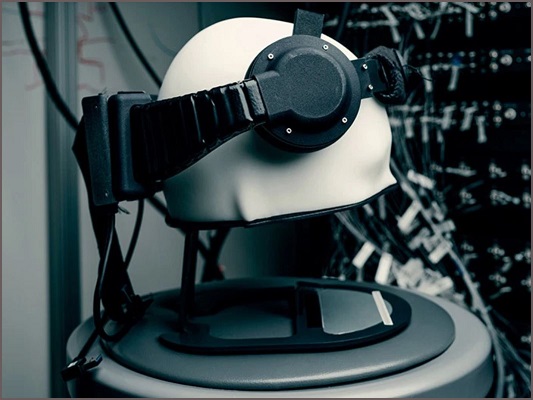A wearable, non-invasive device connected directly to your brain could soon be a reality.
Two years after being announced, Facebook has just unveiled more detailed about its brain-computer interface (BCI) program in a Facebook Reality Labs blog post.
Though still in very early development, the device would sit on your head and directly translate your thoughts.
Facebook said the device could eventually be used for navigating virtual and augmented reality.
“It’s currently bulky, slow, and unreliable,” Facebook said.
“But the potential is significant, so we believe it’s worthwhile to keep improving this state-of-the-art technology over time.
“Being able to recognise even a handful of imagined commands, like ‘home,’ ‘select,’ and ‘delete,’ would provide entirely new ways of interacting with today's VR systems — and tomorrow's AR glasses.”
Facebook has been supporting a research team at the University of California who this week published an article in Nature Communications sharing their latest research into interpreting speech directly from the brain.
Using high-density electrocorticography (ECoG) recordings, the team recorded neural activity while participants listened to questions and responded out loud with answers.
They then successfully decoded small sets of words and phrases from brain activity in real-time using a first-of-its-kind algorithm.
When adapted to a machine learning model, the technology could eventually adapt to the point where it can precisely interpret what an individual is thinking.
Facebook plans on combining this with technology that allows it to measure neural activity from outside the skull.
“Like other cells in your body, neurons consume oxygen when they’re active. So if we can detect shifts in oxygen levels within the brain, we can indirectly measure brain activity,” the Facebook blog post said.
“This is similar to the signals measured today in functional magnetic resonance imaging (fMRI), but using a portable, wearable device made from consumer-grade parts.”
An early prototype of Facebook's BCI. Source: Facebook
Facebook Reality Labs Research Director, Mark Chevillet, recognises how deep into the realms of science fiction this project really is.
“I grew up reading about BCI in William Gibson and Neal Stephenson novels, and I’ve spent most of my adult life trying to figure out if BCI is going to be a real thing – though I’m still surprised that turned out to be a real job,” he said.
“There’s no other way to do it today, but our team’s long-term goal is to make these things possible in a non-invasive, wearable device.”
Like Elon Musk’s Neuralink project, Facebook’s BCI is initially targeted at people with physical or mental impairments that make communication and navigation of digital spaces difficult, if not impossible.
The tech giant continues to spruik its line about about using its technology to “connect with others in a meaningful way” despite Facebook having been used for powerfully effective and divisive political campaigns.
Facebook’s woeful public record around protecting data privacy and blatantly exploiting user information has left it prepared to pre-empt the inevitable misgivings about the ethical use of brain-computer interfaces.
“We can’t anticipate or solve all of the ethical issues associated with this technology on our own,” Chevillet said.
“What we can do is recognise when the technology has advanced beyond what people know is possible, and make sure that information is delivered back to the community.
“Neuroethical design is one of our program’s key pillars — we want to be transparent about what we’re working on so that people can tell us their concerns about this technology.”











